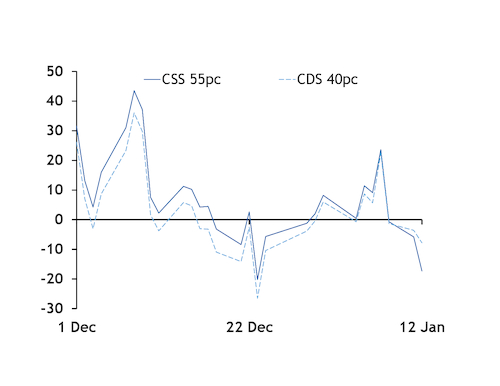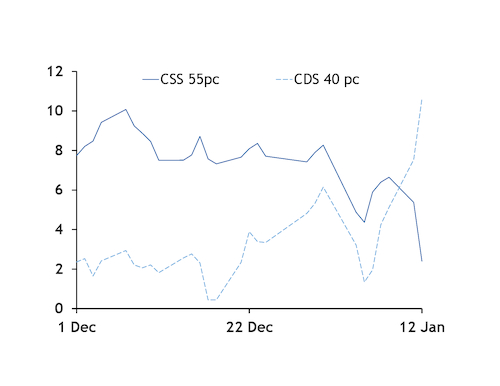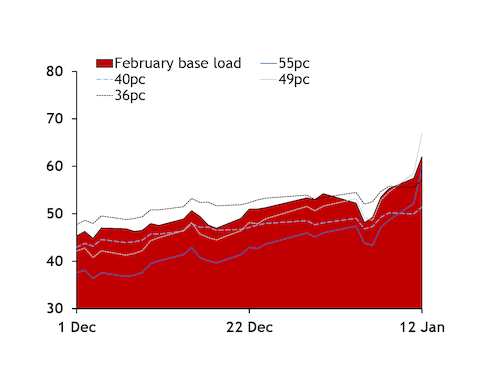A spike in German NCG gas prices in recent sessions has depressed clean spark spreads for February, pushing more coal ahead of gas in the merit order. But this could switch as weather forecasts again point to mild weather, weighing on NCG gas prices.
Medium-efficiency coal-fired units have moved ahead of similar gas-fired plants this week in the forward market. February clean dark spreads for 40pc-efficient plant stood at €10.60/MWh yesterday, while clean spark spreads for a 55pc unit narrowed sharply to €2.40/MWh, Argus calculations show. The last time medium-efficiency coal units were ahead of 55pc gas plants for any front month was on 22 February 2019. A 36pc coal unit moved ahead of 55pc gas yesterday as spreads closed at €4.89/MWh.
Generating margins for medium-efficiency gas-fired plants have been under significant pressure in recent sessions as NCG gas prices rose by up to 34pc on 4-12 January amid weather forecasts pointing to colder-than-average weather and scant LNG arriving in Europe, with Asia-Pacific prices more attractive. In contrast, API 2 coal swaps rose by about 7pc over the same period, pushing more gas behind coal in the merit order.
But this trend could switch again as recent weather forecasts point to a return of mild weather in the wider central-western European region, from the below 0°C forecast previously. Minimum temperatures in the German region of Essen are now expected to be 0.5-3.9°C until at least 26 January, up to 3°C above the norm.
The NCG gas price for delivery in February traded last at €21.09/MWh this morning, down by €4.68/MWh compared with yesterday's close. Clean spark spreads for a 55pc-efficient plant rose to €6.13/MWh considering traded prices this morning, while dark spreads for a 40pc unit were at €7.04/MWh.
Day-ahead market
More German coal has moved ahead of gas in the day-ahead merit order recently.
A 25pc monthly rise in day-ahead NCG gas prices has weighed on the profitability of gas-fired units. Average day-ahead clean spark spreads for a 55pc unit have averaged €2.97/MWh, compared with €3.33/MWh dark spreads for 40pc units, based on Epex spot power prices.
German coal-fired generation has been the highest in January in 14 months at an average of 7.24GW. But gas-fired units remain stronger overall this month, even reaching a new record high for any month at 8.61GW.
Medium-efficient coal and gas-fired units were priced out of the day-ahead market for delivery today as wind was expected to be high. But medium coal units were ahead of gas units for a second consecutive session. Day-ahead clean spark spreads for a 55pc unit were at minus €17.32/MWh, based on the Epex Spot day ahead, while 40pc clean dark spreads were at minus €7.83/MWh.
Coal-fired generation was at 7.02GW yesterday, compared with 7.53GW for gas-fired output. Today so far, coal is at 5.89GW while gas is at 5.63GW.
Wind power generation has averaged 12.97GW this month, below the five-year average of 17GW and making more room for coal burn.
The country has this month mostly experienced colder-than-average weather, supporting power demand for heating on a monthly basis to 54.07GW but still below January 2020, as the country remains under tight restrictions to fight Covid-19.
Lignite-fired generation has also jumped to its highest for any January since at least 2019 at 13.24GW, with even 34pc units priced in.





